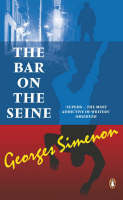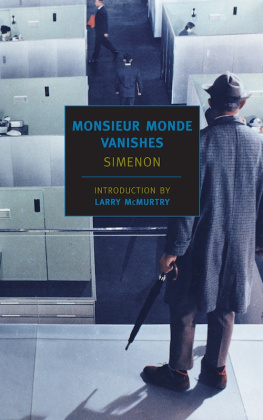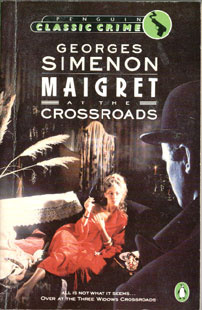Georges Simenon
A Crime in Holland
A book in the Inspector Maigret series
1940
Inspector Maigret arrives in the prim, toylike town of Delfzijl to investigate the murder of Conrad Popinga, a teacher. Almost immediately the French sleuth is presented the floor plans of the victim's house and shown two clues: a sailor's cap in the bathtub and a Manila cigar butt on the dining-room carpet. The suspects: a strapping, giggling farmer's daughter with an interest in men; an angry, flat-chested woman lawyer; a larcenous ship owner; a young and unaccountably frightened cadet; and a pompous criminologist who was found holding a revolver at the scene of the crime. Maigret, meanwhile, is preoccupied with the path nearby, which at night is lit every fifteen seconds by a lighthouse beam. A spot where lovers might be discoveredSimenon tells the absorbing story of people of human appetites and vitality who are put in the straitjacket of small town respectabilityuntil they can no longer stand it. Vintage Simenon.
ONE
A Pedigree Calf
Maigret had only a faint idea of what it was all about when he arrived one May afternoon in Delfzijl, a small town squatting on the low coast in the extreme northeast of the Netherlands.
A certain Jean Duclos, a professor at the University of Nancy, had been on a lecture tour through the countries of northern Europe. At Delfzijl he had been the guest of Monsieur Popinga, who was a teacher on the training ship there, and this Monsieur Popinga had been murdered. Though the French professor could hardly have been called a suspect, he had nevertheless been requested not to leave the town, and to hold himself at the disposal of the police.
That was about all Maigret knew, except for a rather confused report Jean Duclos had forwarded to the Paris police himself. He had at once informed the University of Nancy, whose authorities had then asked for a member of the Police Judiciaire to be sent to the spot.
It was just the job for Maigret, being semiofficial.
He had made it all the less formal by having taken no steps to warn the Dutch police that he was coming.
At the end of Jean Ducloss report was a list of the principal people involved, and it was this list that Maigret had been studying during the last half hour of his journey:
CONRAD POPINGA , the victim, forty-two, formerly a captain in the merchant service, now teaching cadets on the training ship at Delfzijl. Married. No children. Spoke English and German fluently, and fairly good French.
LIESBETH POPINGA , his wife. Daughter of the headmaster of a lyce in Amsterdam, a woman of considerable culture, including a thorough knowledge of French.
ANY VAN ELST , the latters younger sister, on a visit of some weeks in Delfzijl, recently completed her degree in law. Twenty-five years old. Understands a good deal of French, but speaks it badly.
THE WIENANDS , living next door. Carl W. teaches mathematics on the training ship. Wife and two children. No French.
BEETJE LIEWENS , eighteen, daughter of a farmer who breeds pedigree cows. Has twice been to Paris. French quite good.
The names conveyed nothing to Maigret. He had been traveling for a night and half a day and wasnt feeling particularly enthusiastic.
Right from the start, he found Delfzijl disconcerting. At dawn he had found himself rolling through the traditional Holland of tulips. Then came Amsterdam, which he already knew. But Drenthe, an endless stretch of heather, had taken him by surprise. A twenty-mile horizon sectioned by canals.
And what he now came to was something that bore no relation to the ordinary picture postcard of Holland. It was far more Nordic than anything he had imagined.
A small town. At the most, ten or fifteen streets paved with beautiful red tiles, as regularly laid as those of a kitchen floor. Low houses of brick, ornamented with a profusion of carved woodwork painted in cheerful colors.
The whole place was like a toy, all the more so because it was completely encircled by a dike. In this dike were openings with heavy lock gates, which were no doubt closed during spring tides.
Beyond was the estuary of the Ems River, and then the North Sea, a long silver ribbon of water. Ships were unloading their cargoes under the cranes on the quay. In the canals were innumerable sailing boats, big as barges and as heavy, built to withstand the open seas.
The sun shone brightly. The stationmaster was wearing a bright orange cap, to which he automatically raised his hand to salute the unknown passenger.
There was a caf opposite. Maigret went in. But he hardly dared sit down. Not only was it scrubbed and polished like the most respectable of dining rooms, but also the atmosphere was equally homelike.
There was only one table, on which lay all the morning papers, fixed to wire frames. The proprietor, who was having a glass of beer with two customers, came over to welcome the newcomer.
Do you speak French? asked Maigret.
The proprietor shook his head, with a touch of embarrassment.
Donnez-moi de la bireBier!
Having sat down, he once more scanned Professor Ducloss list. Somehow the last name seemed to him the most hopeful. He showed it to the proprietor, and two or three times pronounced the name:
Liewens.
The three men began talking together. Then one of them stood up, a huge fellow wearing a fishermans cap, who beckoned Maigret to follow. The inspector had not yet provided himself with Dutch money. When he offered a hundred-franc note, the proprietor waved it aside.
Morgen!Morgen!
Tomorrow! So hed have to come back!
Yes, the atmosphere was certainly one of intimacy; it was all so simple and candid. Without a word, Maigrets guide led him through the streets of the little town. On the left, a large shed was full of old anchors, rope, lengths of cable, buoys, compasses. Gear was even spread out along the street. Farther on, a sailmaker was working on his doorstep. A confectioners window exhibited a great choice of chocolates and complicated sweetmeats.
Speak English?
Maigret shook his head.
Deutsch?
Maigret shook his head again, at which the man relapsed into silence.
At the end of the street, open country began: green meadows; a canal, most of whose surface was broken by floating tree trunks from northern countries waiting to be towed to their various destinations inland.
In the distance, a long roof of glazed tiles.
Liewens! said the man, pointing to it. Dag, mijnheer!
Maigret went on alone after doing his best to thank his guide, who had come nearly a quarter of an hours walk to do a perfect stranger a good turn.
The sky was clear, the air extraordinarily limpid. The inspector skirted a lumberyard in which piles of oak, mahogany, and teak rose high as the houses.
There was a boat moored to the bank, children playing close by. Then nothing for more than half a mile but logs in the canal, white fences around fields where, here and there, magnificent cows were grazing. Then Liewens farm.
And here was something else Maigret hadnt bargained for. The word farm had a different meaning here from the one he was accustomed to. For him the word had always implied a thatched roof, a manure heap, the clucking of hens and cackle of geese.
The one he now came to was a fine new building surrounded by a large garden full of blooming flowers. Everything was trim and peaceful. On the canal opposite the house, a graceful mahogany rowing dinghy. By the gate, a womans bicycle, nickel-plated.












